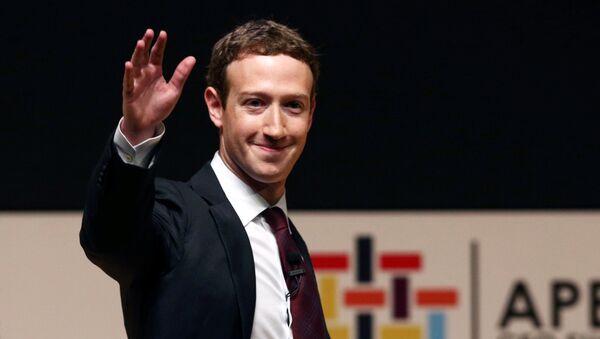Denis Bolotsky — Unlike most top government officials whose flight itineraries are usually kept secret, Facebook CEO Mark Zuckerberg preferred to share the details of his journey to Peru with his followers.
Thousands of Peruvians greeted him in the comments to his latest posts, treating the founder of the social network almost like another head of state.
Mark Zuckerberg's Facebook followers treat him almost like head of state. Some ask him to deliver their messages to APEC leaders. pic.twitter.com/1ecWLf6Xn3
— Denis Bolotsky (@BolotskySputnik) November 19, 2016
On Saturday Zuckerberg delivered his keynote speech at the APEC Summit. He focused on health and longevity research, artificial intelligence, cybersecurity and connectivity, and at one point even quoted JFK:
“As Kennedy said – “It’s a time for greatness.” And today with accelerating progress, and science and technology, our generation has the potential to do even more great things than in any other time in history.”
According to Facebook's founder, in a modern world people don’t have to rely on media anymore to share the information and express their concerns, so he considers increasing connectivity around the world very important:
"Giving 2 billion people a voice is a great thing to do. You know what’s even better? Giving 7 billion people a voice.”
As for giving people a voice, there are also a number of connectivity solutions on display in Lima, including a model of a solar-powered drone that Facebook will be using to distribute internet in remote areas:
Facebook spokesperson Alan Cooper told Sputnik that when it comes to connectivity the company is working in collaboration with the telecom industry to achieve its goals, but it’s also developing its own technology and infrastructure:
“Technology doesn’t have to be tethered to current infrastructure. And so, a lot of the things we’re building actually free up more economical things to develop and deliver internet – things like drones, things like urban-based solutions that increase the speed of publically available wi-fi.”
But despite good intentions, the way in which Facebook handles user content, including chats, has been receiving some criticism from security experts.
In October this year Facebook Messenger and WhatsApp, which is also owned by Facebook, were named the most secure chat platforms by Amnesty International. However, both apps received criticism from another watchdog – the Electronic Frontier Foundation, for a range of issues, including flaws in encryption technology.
Nevertheless, Facebook representatives say that the company invests heavily in privacy and the machine translation project is currently more of a signal test, rather than something that analyzes all of the information passing the network. So, for now, it’s perhaps too early to be concerned about Facebook’s AI revolting against its creators and becoming the real-life version of the evil Skynet from the movie “Terminator.”




